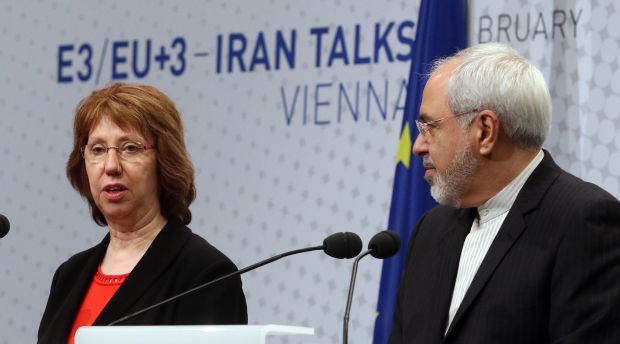
European Union High Representative Catherine Ashton, left, and Iranian Foreign Minister Mohammad Javad Zarif, speak to the press after closed-door nuclear talks in Vienna, Austria, Thursday, Feb. 20, 2014. (AP Photo/Ronald Zak)
In a joint statement, they said the next round of negotiations would begin in Vienna on March 17, continuing a process likely to take at least six months and probably longer.
Expectations had been modest as the talks started Tuesday, and the upbeat tone on a framework for future talks appeared aimed at least in part to encourage skeptics both inside and outside Iran that the negotiations had a chance to succeed despite huge gaps between the Iranians and the six powers.
The six want Tehran to agree to significant cuts in its nuclear program to reduce concerns it could be turned quickly to weapons use.
Iran opposes cuts, saying its program is not aimed at building weapons. The US and its partners say that Iran must come to an agreement if it wants a full end to sanctions crippling its economy.
“We have…identified all of the issues we need to address for a comprehensive and final agreement,” said Catherine Ashton, the EU’s top diplomat who convened the talks between Iran and the six powers—the United States, Russia, China, Britain, France and Germany.
“It won’t be easy, but we’ve gotten off to a good start,” she said in a statement read later in Farsi by Iranian Foreign Minister Mohammad Javad Zarif.
The talks are designed to build on a first-step deal in effect since last month that commits Iran to initial nuclear curbs in return for some easing of sanctions. The deal can be extended by mutual consent after six months, and both sides say any final deal will be tough to reach.
The six countries want to leave Iran with little capacity to quickly ramp up its nuclear program into weapons-making mode with enriched uranium or plutonium, which can be used for the fissile core of a missile warhead.
They say Iran should dismantle or store most of its 20,000 uranium-enriching centrifuges, including some not yet working. They also want a reactor now being built to either be scrapped or converted from a heavy-water setup to a light-water facility that makes less plutonium.
Zarif, who came to the talks vowing Iran would never strip down its nuclear facilities, was smiling and relaxed as he read out the joint statement. But in a message intended for skeptics at home who fear Iran will give up too much at the talks, he told state TV afterward that the nation would “not close down any site.”
